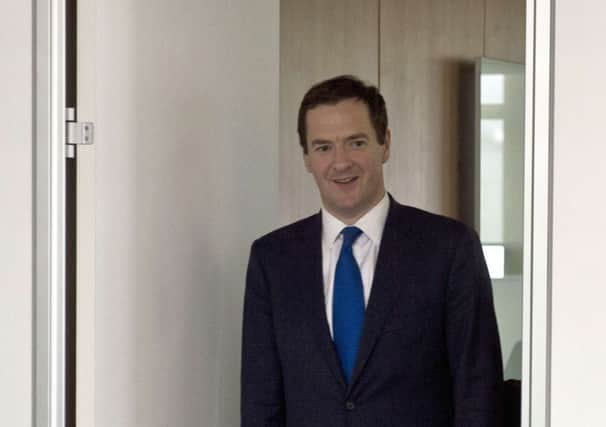Boost for workers as inflation hits new low


The Consumer Prices Index (CPI) rate dropped to a fresh four-year low of 1.6 per cent, from 1.7 per cent in February, according to the Office for National Statistics (ONS).
The figures published yesterday came ahead of separate ONS labour market statistics which are expected to show that regular pay is rising at a rate of 1.8 per cent, up from 1.3 per cent.
Advertisement
Hide AdAdvertisement
Hide AdCPI has not been lower since October 2009, when it stood at 1.5 per cent. It is also the first time since records began in 1997 that inflation has fallen for six consecutive months.
The latest fall was widely predicted by economists and is likely to herald an end to a six-year period during which pay growth has lagged behind the rise in the cost of living, effectively shrinking workers’ spending power.
Last night Chancellor George Osborne welcomed the inflation numbers.
“Lower inflation and rising job numbers show our long-term plan is working and bringing greater economic security,” he said. “But there is still much more we need to do to build the resilient economy I spoke of at the Budget.”
Earnings have not increased at a higher rate than inflation since a brief spike in March and April 2010, and have not consistently been improving since 2008.
An end to the squeeze will be seen as a watershed moment in the recovery and the news is expected to be seized upon by the coalition as evidence to counter Labour charges that the economic upturn has yet to benefit ordinary working families.
Yesterday’s figures showed that the pressure on households was partly eased by food and non-alcoholic drink inflation falling to a new four-year low of 1.7 per cent. It was 1.3 per cent in February 2010.
But a greater downward pressure on inflation came from fuel prices.
Advertisement
Hide AdAdvertisement
Hide AdPetrol was unchanged from February to March this year, against a price rise of 2.2p per litre for the same period in 2013. Diesel fell by 0.4p against a 1.9p rise in 2013.
Clothing and footwear prices increased by a lower rate than last year, with much of the downward effect coming from women’s fashion.
Upward contributions to inflation came from factors including higher bills for overnight hotel stays and more expensive alcoholic spirits.
A separate measure of inflation, the Retail Prices Index, which includes housing costs, fell to 2.5 per cent in March from 2.7 per cent in February.
A new measure of inflation, CPIH, which also includes housing costs, fell to 1.5 per cent, from 1.6 per cent in February.
Yesterday Prime Minister David Cameron tweeted: “Welcome news that inflation has fallen again, meaning more financial security for hardworking families.”
Economist Alan Clarke, of Scotiabank, said the latest CPI reading was likely to mark the low point in UK inflation.
He said a rebound is likely to come from the impact of Easter holidays on airfares and a smaller, lower impact from petrol prices. But the improving purchasing power signalled by the expected return to real-terms wage growth “increases the likelihood that the recovery will persist”.
Advertisement
Hide AdAdvertisement
Hide AdHe added: “At the moment, consumer spending growth is being boosted by falling savings and rising borrowing.
“If real incomes continue to improve over the coming quarters, as we expect, then spending growth will be increasingly underpinned by solid fundamentals rather than the feel-good factor associated with a booming housing market.”
Samuel Tombs, of Capital Economics, said: “March’s UK inflation figures suggest that the six-year squeeze on real earnings is finally over.
“We think that a combination of stable commodity prices, falling import prices and recovering productivity will push CPI inflation as low as 1 per cent before the year is out.
“This would provide more solid foundations for the recovery in consumer spending and enable the MPC [the Bank of England’s Monetary Policy Committee] to keep the Bank rate at 0.5 per cent until late 2015.”
SEE ALSO